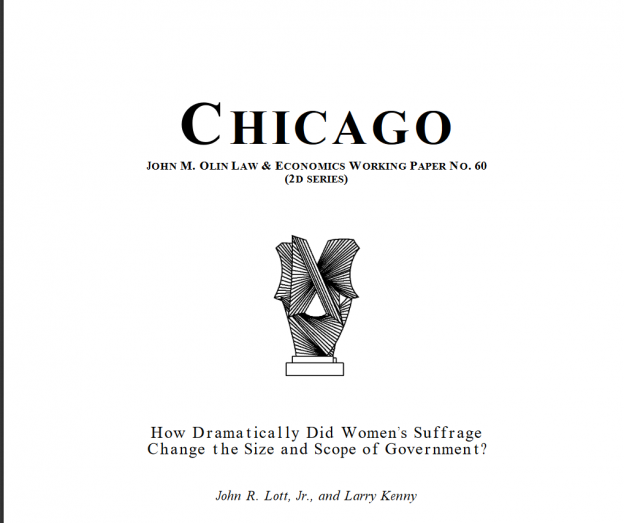In 2007, I ventured that, “I’d give up my vote if that would guarantee that all women were denied the vote.”—ILANA Mercer (August 8, 2007)
Coming from the anti-statist stance, the sentiment is a solid one. It’s anchored in data.
One only has to trace the statistically significant correlation between women’s suffrage and the change in the size and scope of the state, as did John R. Lott, Jr. (Yale University) and Lawrence W. Kenny (University of Florida), to realize that the female suffrage has undermined the small-government project.
“How Dramatically Did Women’s Suffrage Change the Size and Scope of Government?” is in the Journal of Political Economy (Vol. 107, Number 6, Part 1, pp. 1163-1198, December 1999).
Of course, the tipping point has long been reached, so my altruistic gesture would be in vain.
Naturally, some will laud the growth of government under female tutelage; others will lament it.
Abstract
This paper examines the growth of government during this century as a result of giving women the right to vote. Using cross-sectional time-series data for 1870 to 1940, we examine state government expenditures and revenue as well as voting by U.S. House and Senate state delegations and the passage of a wide range of different state laws. Suffrage coincided with immediate increases in state government expenditures and revenue and more liberal voting patterns for federal representatives, and these effects continued growing over time as more women took advantage of the franchise. Contrary to many recent suggestions, the gender gap is not something that has arisen since the 1970s, and it helps explain why American government started growing when it did.
And look at these excerpts with their bold deductions. The following writers would have been “canceled” by the bumper crops of cretins who control the American intelligentsia (that is not very intelligent).
It is not really surprising that this welfare state should breed a politics not of “justice” or “fairness” but of “compassion,” which contemporary liberalism has elevated into the most important civic virtue. Women tend to be more sentimental, more risk-averse and less competitive than men—yes, it’s Mars vs. Venus—and therefore are less inclined to be appreciative of free-market economics, in which there are losers as well as winners. College-educated women—the kind who attend Democratic conventions—are also more “permissive” and less “judgmental” on such issues as homosexuality, capital punishment, even pornography.
—Irving Kristol, “The Feminization of the Democrats,” The Wall Street Journal (September 9, 1996): p. A16
Citing marriage as “a very important financial divider,” the American Enterprise Institute’s Doug Besharov suggests more married women did not vote for Dole because of a widespread sense of societal insecurity: “It is not that they distrust their husband, but they have seen divorce all around them and know they could be next.” The Polling Company’s Kellyanne Fitzpatrick is categorical: “Women see government as their insurance.” (Perhaps significantly, of the 24 million individuals working in government and in semi-governmental non-profit jobs, 14 million—58 percent—are women.)
—The Richmond Times Dispatch, December 5, 1996



 print
print